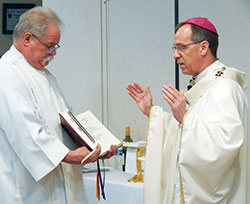Archbishop: We must see others ‘through the eyes of faith’

Altar server Tim Spreitzer of SS. Peter and Paul Cathedral Parish in Indianapolis holds the Missal for Archbishop Charles C. Thompson during a March 18 Mass celebrated during a Catholic Charities statewide conference at the Wellington Conference Center in Fishers, Ind., in the Lafayette Diocese. (Photo by Mike Krokos)
By Mike Krokos
FISHERS, IND.—Both the Indiana bishops’ 2015 pastoral letter on poverty and Archbishop Charles C. Thompson’s pastoral letter on Christian anthropology in 2018 remind us that as Catholics we must see everything through the eyes of faith.
“A righteous person sees through the eyes of faith, through the eyes of God, rather than worldly eyes,” Archbishop Thompson said on March 18 during his address at a Catholic Charities statewide conference at the Wellington Conference Center in Fishers, Ind., in the Lafayette Diocese.
Citing Pope Francis on numerous occasions, including from his apostolic exhortation “Evangelii Gaudium” (“The Joy of the Gospel”), the archbishop said that we, as a community, can learn much from the poor.
Archbishop Thompson also noted how several bishops have echoed the Holy Father’s words when it comes to society’s most vulnerable: “The unborn are not a problem; they’re human beings. Migrants and refugees are not a problem; they’re human beings. The poor are not a problem; they’re human beings.”
Drawing on the Indiana bishops’ pastoral “Poverty at the Crossroads: The Church’s Response to Poverty in Indiana,” Archbishop Thompson used the document’s “see, judge and act” formula to expand on Pope Francis’ teachings. The bishops’ letter focuses on family, health care, employment and education. It also emphasizes what Catholics can do as a community of faith to strengthen these areas for those who live in poverty in the state.
“We need to see people first as human beings, not as problems. You do that very, very well in your work at Catholic Charities,” Archbishop Thompson told the approximately 90 people in attendance.
As people of faith, we also need to be willing to sacrifice to lift up poor people, Archbishop Thompson said. “What are you willing to give up in your lifestyle that can lift them up? That’s the great challenge for us today.
“We have to see, judge and act about ourselves as much as we see among the environment of the people we are called to serve.”
“We Are One in Christ: A Pastoral Letter to the Clergy, Religious and Faithful People of Central and Southern Indiana on Fundamentals of Christian Anthropology” was the first pastoral letter issued by Archbishop Thompson since he was installed as shepherd of the archdiocese in July 2017.
In introducing it on Feb. 14, 2018, the archbishop described Christian anthropology as “the way Christians view human dignity and the end or purpose of human society.”
Archbishop Thompson said issues such as immigration, abortion, racism, religious liberty and drug abuse were relevant during the summer of 2017 when he began his leadership of the archdiocese. They were also part of the discussions during the U.S. Conference of Catholic Bishops’ November meeting in Baltimore that year. He felt called to write about them as shepherd of the Church in central and southern Indiana.
In discussing his pastoral, the archbishop referenced Pope Francis’ 2015 encyclical, “Laudato Si’, on Care for Our Common Home.”
“He [Pope Francis] talked about interconnectedness. You have four relationships: you have a relationship with God, a relationship with self, a relationship with others, and a relationship with creation,” Archbishop Thompson said. “None of these is kept in a vacuum from the others. If one of those is off kilter, all four will be off kilter.”
That interconnectedness we have as human beings, the archbishop said, allowed him to tie these issues together through Christian anthropology.
“… That whole sense of being in Christ, understanding ourselves in the light of Jesus Christ. … In light of Jesus Christ, how do we respond to the opioid crisis? How do we respond to migration and refugee issues? How do we respond to the gun control issue? How do we respond to racism?”
Archbishop Thompson began the event by celebrating Mass with conference attendees.
In his homily, the archbishop reflected on St. Joseph, whose feast day as the spouse of the Blessed Virgin Mary was celebrated on the day of the gathering.
“Joseph was righteous. He could be open to God’s plan,” he said. “With Joseph taking Mary into his household, not only was he saving her from shame, necessarily, or from death, but he was also taking the risk of bringing shame upon himself and his own household.
“It shows even greater depth of his trust in God, in the midst of chaos, in the midst of this [situation] that didn’t make any sense.”
St. Joseph offers a great example for each of us, Archbishop Thompson noted, “to listen amidst the chaos, how God is unfolding that same plan of salvation for us, in our own time, and in our own day. How we’re called to be guardians and protectors of the weak, the poor, the most vulnerable in our midst.”
David Bethuram, executive director of Catholic Charities in the archdiocese, reminded those in attendance that their ministry calls them to be “one, holy, catholic and apostolic,” the “four marks” of the Church.
“Each one of us has been given gifts by God in such a way that it not only provides good services,” he said, “but provides the heart to what we do.” †
